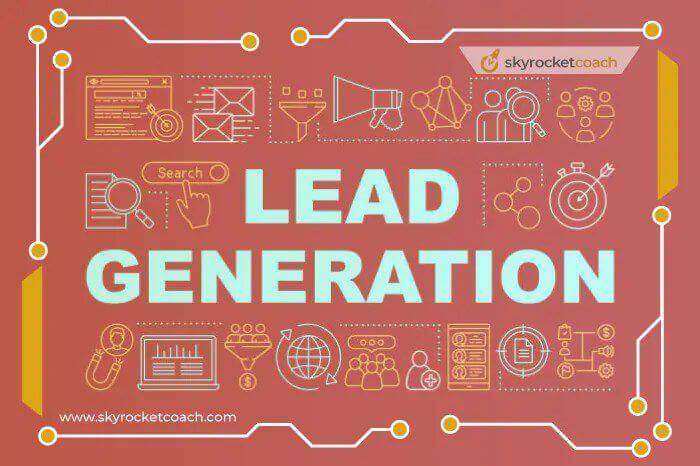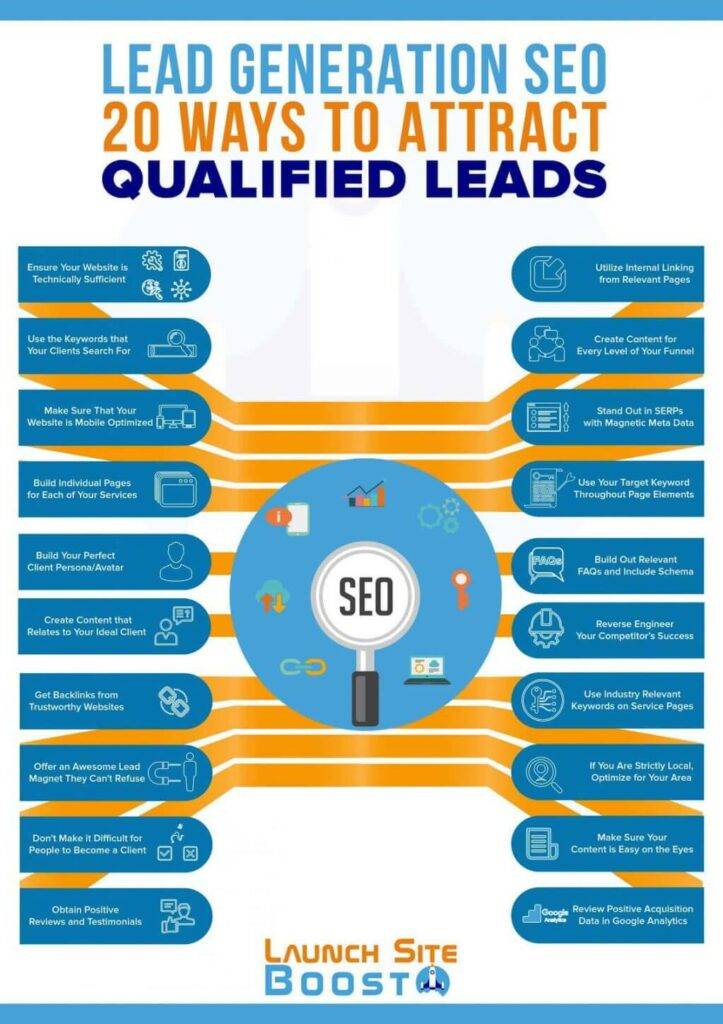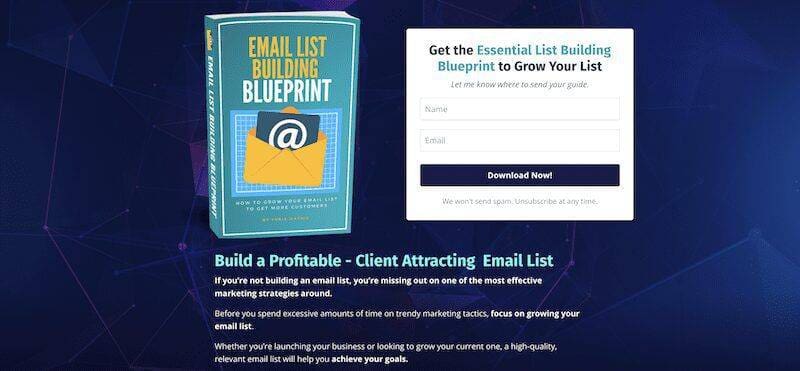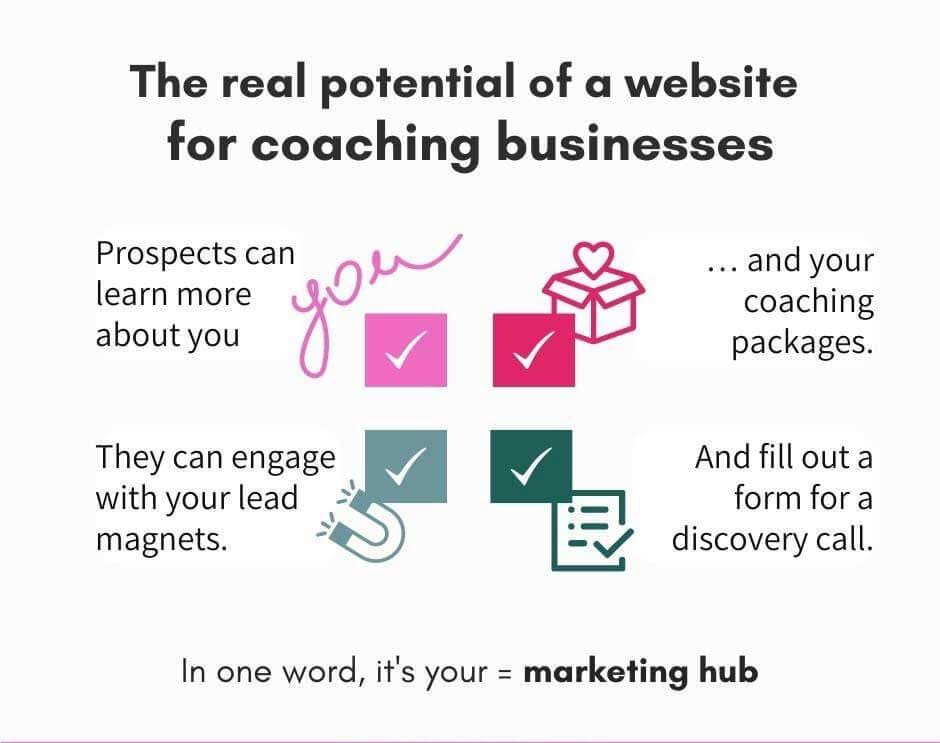
Source: i0.wp.com
Importance of Attracting Qualified Leads for Coaches
Why Qualified Leads Are Essential for Coaches
As a coach, attracting qualified leads is crucial for the success and growth of your business. Qualified leads are individuals who have expressed a genuine interest in your coaching services and are more likely to convert into paying clients. Here’s why qualified leads are essential for coaches:
- Higher Conversion Rates: When you have qualified leads, you have a higher chance of converting them into paying clients. These leads already have an understanding of your coaching services and are actively seeking solutions to their problems.
- Targeted Audience: Qualified leads are individuals who fit your ideal client profile. They have specific needs and challenges that align with your expertise. This targeted audience ensures that you are attracting individuals who can benefit the most from your coaching services.
- Increased Revenue: By focusing on attracting qualified leads, you are more likely to generate higher revenue for your coaching business. These leads are more willing to invest in your services and are more likely to become repeat clients or refer others to your business.
- Building Credibility: As you attract qualified leads and successfully help them achieve their goals, you build credibility and establish yourself as an expert in your coaching niche. This can lead to positive testimonials, reviews, and word-of-mouth referrals, further attracting more qualified leads to your business.
Benefits of Having Qualified Leads in Coaching Business
Having a steady stream of qualified leads for your coaching business comes with several benefits:
- Time Efficiency: When you attract qualified leads, you can focus your time and energy on individuals who are more likely to become paying clients. This saves you time from chasing leads that may not be genuinely interested in your services.
- Increased Client Satisfaction: Qualified leads are individuals who genuinely need your coaching services and are likely to benefit from them. By working with these clients, you can provide more personalized and impactful coaching, leading to higher client satisfaction.
- Referral Opportunities: Satisfied clients who have achieved their goals through your coaching are more likely to refer others to your business. By attracting qualified leads, you increase the chances of receiving referrals from your happy clients, leading to a growing client base.
- Business Growth: Attracting qualified leads allows you to grow your coaching business consistently. With a steady stream of qualified leads, you can expand your reach, increase your client base, and ultimately achieve your business goals.
In conclusion, coaches must attract qualified leads to increase conversion rates, target the right audience, generate higher revenue, build credibility, save time, increase client satisfaction, and facilitate business growth.

Source: frnation.com
Identifying Your Target Audience
Defining Your Ideal Client Avatar
To attract qualified leads as a coach, clearly defining your ideal client avatar is crucial. This is a fictional representation of your ideal client based on demographics, psychographics, and other relevant factors. Here are some steps to help you define your ideal client avatar:
- Demographics: Consider factors such as age, gender, location, occupation, and income level. Understanding these demographics will help you tailor your marketing messages to resonate with your target audience.
- Psychographics: Dig deeper into your ideal client’s interests, values, attitudes, and lifestyle. This information will guide you in creating content and offers that align with their desires and motivations.
- Pain Points and Goals: Identify the main challenges and pain points your ideal clients are experiencing and their goals and aspirations. By understanding their needs, you can position yourself as the solution they are seeking.
Researching and Understanding Your Target Market
Once you have defined your ideal client avatar, it’s time to conduct thorough research to gain a deeper understanding of your target market. Here are some strategies to help you gather valuable insights:
- Surveys and Interviews: Reach out to your current and past clients, as well as your email subscribers, and ask them about their needs, preferences, and challenges. This direct feedback will provide invaluable insights into your target market.
- Competitor Analysis: Study your competitors who serve a similar target audience. Analyze their marketing strategies, messaging, and offers to identify gaps and opportunities in the market.
- Social Listening: Monitor conversations on social media platforms, forums, and online groups related to coaching and your target market. This will give you a pulse on what your potential clients are discussing and the problems they seek solutions for.
By conducting thorough research and understanding your target market, you can develop targeted marketing campaigns and messaging to attract qualified leads who will most likely benefit from your coaching services.
Creating Engaging Content
The Role of Content in Attracting Qualified Leads
Creating engaging content is a crucial component of any successful lead-generation strategy. By providing valuable and relevant information to your target audience, you can attract qualified leads and position yourself as an authority in your coaching niche. Here’s why content is essential for attracting qualified leads:
- Education and Value: By creating content that educates and provides value to your target audience, you establish yourself as a trustworthy source of information. This builds trust and credibility, making prospects more likely to consider your coaching services.
- Search Engine Optimization: Creating high-quality content with relevant keywords can improve your website’s visibility in search engine results. This increases organic traffic and attracts potential clients who are actively searching for coaching solutions.
- Social Media Engagement: Engaging and shareable content can help you attract qualified leads through social media platforms. When your content resonates with your target audience, they are more likely to share it with others, expanding your reach and generating more leads.
Types of Content That Resonate with Your Target Audience
To attract qualified leads, creating content that resonates with your target audience is important. Here are some types of content that are effective in attracting and engaging potential coaching clients:
- Blog Articles: Writing informative and well-researched blog articles allows you to share your expertise and provide valuable insights to your audience. Use your blog to address common challenges, provide solutions, and demonstrate your coaching knowledge.
- Video Content: Videos are a highly engaging form of content that can help you connect with your audience on a more personal level. Consider creating instructional videos, client testimonials, or live Q&A sessions to showcase your coaching skills and attract qualified leads.
- Case Studies and Success Stories: Sharing success stories and case studies of your past clients can demonstrate the effectiveness of your coaching programs. Highlight the challenges clients faced, the strategies you implemented, and the results they achieved with your guidance.
- Infographics and Visual Content: Infographics and visually appealing content are highly shareable and can effectively convey complex information. Use visuals to simplify concepts, present statistics, and captivate your audience’s attention.
- Webinars and Workshops: Hosting webinars and workshops allows you to provide in-depth coaching sessions to a larger audience. This interactive format enables you to showcase your expertise while capturing leads through registrations.
Remember, it’s essential to create content that matches the preferences and needs of your specific target audience. By consistently delivering valuable and engaging content, you can attract qualified leads and build a strong client base for your coaching business.

Source: b2962890.smushcdn.com
Building an Effective Lead Generation Strategy
To attract qualified leads as a coach, it’s crucial to have an effective lead generation strategy in place. Here are some steps to help you build a successful strategy:
Setting SMART Goals for Lead Generation
When developing your lead generation strategy, setting specific, measurable, achievable, relevant, and time-bound (SMART) goals is essential. This will provide you with a clear direction and help you track your progress. Some SMART goals for lead generation could include:
- Increase website traffic by 20% in the next three months
- Generate 50 new leads per month through content marketing campaigns
- Increase conversion rate from leads to clients by 10% in six months
Choosing the Right Lead Generation Channels and Tactics
You need to choose the right lead generation channels and tactics to attract qualified leads. Here are some popular and effective options to consider:
- Content Marketing: Create valuable and informative content, such as blog posts, videos, or ebooks, that address the pain points and challenges of your target audience. Promote this content through social media, email marketing, and search engine optimization (SEO) techniques.
- Social Media Marketing: Utilize platforms like Facebook, LinkedIn, Instagram, and Twitter to engage with your audience, share valuable content, and promote your coaching services. Develop an active presence on these platforms and leverage targeted advertising campaigns.
- Webinars and Workshops: Host online webinars or in-person workshops where you can showcase your expertise, provide value, and capture leads through registrations. Be sure to follow up with attendees and nurture them through the sales funnel.
- Referrals and Testimonials: Encourage satisfied clients to refer you to their networks and provide testimonials that showcase the results they achieved through your coaching. Leverage these referrals and testimonials in your marketing efforts.
Remember, the key to an effective lead generation strategy is understanding your target audience, tailoring your tactics to their needs, and consistently tracking and optimizing your efforts for maximum results.

Source: launchsiteboost.com
Optimizing Your Website and Landing Pages
Key Elements of a Lead-Generating Website
To attract qualified leads as a coach, optimizing your website to capture visitor information effectively is crucial. Here are some key elements of a lead-generating website:
- Clear Value Proposition: Clearly communicate the benefits and value you provide as a coach. Make it clear why potential clients should choose you over your competitors.
- Compelling Call-to-Action (CTA): Place a prominent, attention-grabbing CTA on your website, encouraging visitors to take action such as signing up for a free consultation or subscribing to your newsletter.
- Lead Capture Forms: Include lead capture forms strategically on your website. Keep the forms simple and ask for only essential information to make sure visitors are satisfied.
- Testimonials and Social Proof: Display testimonials from satisfied clients to build trust and credibility. Incorporate social proof like client success stories or case studies to demonstrate the results you can achieve.
- Mobile-Friendly Design: Optimize your website for mobile devices as many visitors may access it from their smartphones or tablets. Ensure the website layout is responsive and provides a seamless user experience across different devices.
Designing High-Converting Landing Pages for Lead Capture
Landing pages play a vital role in capturing leads effectively. Here are some tips for designing high-converting landing pages:
- Create a Compelling Headline: Catch visitors’ attention with a strong and relevant headline highlighting the benefits they will receive by filling out the form.
- Keep the Page Clean and Uncluttered: Eliminate distractions and focus on the main purpose of the landing page – lead capture. Avoid excessive text, irrelevant images, or links that divert visitors’ attention.
- Use Compelling Visuals: Include relevant and eye-catching images or videos that further emphasize the value of your coaching services.
- Highlight the Benefits: Clearly communicate the benefits and outcomes clients can expect by working with you. Show how your coaching can address their pain points and help them achieve their goals.
- Create a Clear Call-to-Action: Place a prominent and easy-to-see CTA on the landing page. Use actionable language and make it clear what action visitors should take to move forward.
- Test and Optimize: Continuously test and optimize your landing pages to improve conversion rates. Use A/B testing to experiment with different elements such as headlines, images, form fields, and CTAs to find the best-performing variations.
Optimizing your website and landing pages for lead generation is essential to attract qualified leads as a coach. By implementing these key elements and best practices, you can increase your online presence’s effectiveness and capture potential clients’ attention.
Leveraging Social Media for Lead Generation
Understanding the Power of Social Media in Lead Generation
Social media has become an essential tool for coaches to attract and generate qualified leads. With billions of active users, platforms like Facebook, Instagram, Twitter, and LinkedIn provide coaches with a wide audience to engage with and showcase their expertise. Here’s why social media is crucial for lead generation:
- Wide Reach: Social media platforms have a vast user base, allowing coaches to reach a large audience and expand their reach beyond geographic boundaries.
- Targeted Advertising: Social media platforms offer advanced targeting options, allowing coaches to narrow down their audience based on demographics, interests, and behavior. This ensures that your content reaches the right people who are most likely to convert into leads.
- Brand Building: Social media platforms provide an opportunity for coaches to build their brand and establish themselves as thought leaders in their niche. Consistently sharing valuable content and engaging with your audience can help in building trust and credibility.
Strategies for Building an Engaged Social Media Following
Building a strong and engaged following on social media is essential for attracting qualified leads. Here are some strategies to consider:
- Define Your Target Audience: Before diving into social media, it’s crucial to understand your target audience. Define their demographics, interests, and pain points to create content that resonates with them.
- Consistent and Valuable Content: Consistently share valuable content that educates, inspires, and solves problems for your audience. This can include blog posts, videos, infographics, and quotes.
- Engage and Respond: Social media is all about building relationships. Engage with your audience by responding to comments, messages, and mentions. Show genuine interest in their questions and concerns.
- Collaborate with Influencers: Collaborating with influencers in your niche can help expand your reach and attract new followers. Look for influencers who share a similar target audience and collaborate on content or promotions.
- Run Contests and Giveaways: Running contests or giveaways on social media can help increase engagement and attract new followers. Encourage participants to share your content and tag their friends for a chance to win.
Social media is a powerful tool for coaches to attract and generate qualified leads. By understanding the power of social media and implementing effective strategies, coaches can build an engaged following and convert them into paying clients.

Source: b1039798.smushcdn.com
Implementing Email Marketing Campaigns
Creating Compelling Lead Magnets for Email Capture
Implementing effective email marketing campaigns is crucial to attract qualified leads and build your coaching business. One of the first steps is to create compelling lead magnets that entice potential clients to provide their email addresses. Here are some strategies to consider:
- Valuable Content: Offer a free ebook, guide, or checklist that provides valuable information related to your coaching niche. Make sure the content is actionable and solves a specific problem for your target audience.
- Webinars and Workshops: Host live webinars or interactive workshops where participants can learn from you and gain insights into their challenges. Require registration with an email address to access the event.
- Exclusive Access: Offer access to exclusive content or resources that are only available to subscribers. This could include insider tips, case studies, or interviews with industry experts.
- Quizzes and Assessments: Create interactive quizzes or assessments that help potential clients gain clarity on their goals or challenges. Provide personalized results and recommendations upon completion, which can be delivered via email.
- Free Consultations or Discovery Calls: Offer potential clients a complimentary consultation or discovery call. Require them to provide their email address to schedule the session.
Nurturing Leads with Email Sequences and Automation
Once you have captured email addresses, nurturing your leads through email sequences and automation is important. Here are some strategies to consider:
- Welcome Series: Send new subscribers an automated welcome email series. Introduce yourself, provide an overview of your coaching services, and deliver additional value through relevant content.
- Educational Content: Share educational content with your leads to establish yourself as an authority in your coaching niche. This could include blog posts, videos, or podcasts that address common challenges and provide practical solutions.
- Personalization: Use email marketing software to segment your leads based on their interests and engagement levels. Tailor your emails to specific segments and provide personalized recommendations.
- Call-to-Action: Include clear call-to-action buttons or links in your emails, encouraging leads to take the next step. This could be scheduling a discovery call, signing up for a paid program, or attending a live event.
- Follow-up and Re-engagement: Regularly assess the engagement of your email list and identify leads who have gone inactive. Send re-engagement emails or follow-ups to rekindle their interest and encourage them to take action.
Implementing email marketing campaigns can significantly impact the growth of your coaching business. By creating compelling lead magnets and nurturing your leads through email sequences and automation, you can attract qualified leads and build lasting relationships with potential clients.

Source: studiofordigitalgrowth.com
Utilizing SEO to Drive Qualified Leads
Search Engine Optimization (SEO) is a powerful strategy that can help coaches attract qualified leads to their website. By optimizing your website for search engines, you can increase your visibility and reach a larger audience of potential clients. Here are some tactics to help you optimize your website and improve your search rankings:
Optimizing Your Website for Search Engines
- Keyword Research: Conduct keyword research to identify the search terms your target audience uses to find coaching services. Include these keywords in your website content, meta tags, and headers to improve your visibility in search results.
- High-Quality Content: Create high-quality content that is valuable and relevant to your target audience. This can include blog articles, videos, podcasts, and downloadable resources. Optimize your content with relevant keywords and provide comprehensive information to establish your authority and credibility.
- Site Structure: Ensure that your website has a clear and organized structure. Use a logical hierarchy of pages and create a navigation menu that is easy to navigate. This will help search engines understand the structure of your website and improve user experience.
Tactics for Building Authority and Improving Search Rankings
- Link Building: Build high-quality backlinks from reputable websites to increase your website’s authority and improve search rankings. This can be done through guest blogging, partnerships, and outreach to industry influencers and publications.
- Social Media Presence: Use social media platforms to promote your coaching services and share your content. Engage with your audience, encourage social sharing, and build a community around your brand. Social signals can indirectly impact search rankings.
- Local SEO: If you offer coaching services in a specific location, optimize your website for local search. Include your business address and contact information on your website and create listings on local directories. This will help potential clients find you when searching for coaching services in their area.
Remember, SEO is an ongoing process that may take time to see results. Consistently monitor your website’s performance, track keyword rankings, and make adjustments as needed to improve your SEO strategy and attract qualified leads continually.
 Source: leadgenera.lg-cms.com
Source: leadgenera.lg-cms.com
Networking and Collaboration
The Value of Building Relationships in Lead Generation
Building relationships is key when it comes to attracting qualified leads as a coach. Networking and collaboration can play a vital role in expanding your reach and establishing yourself as an authority in your field. Here’s why building relationships matter in lead generation:
- Trust and Credibility: Building relationships allows you to establish trust and credibility with your target audience. By nurturing relationships with potential clients, you can showcase your expertise and build a reputation as a reliable and knowledgeable coach.
- Word-of-Mouth Referrals: When you build strong relationships with clients and colleagues, they are more likely to refer you to others in their network. Word-of-mouth referrals can be a powerful source of qualified leads, as they come from trusted sources and carry higher trust and credibility.
- Strategic Partnerships: Collaborating with industry professionals who have complementary skill sets can open up new opportunities for lead generation. By partnering with other coaches or service providers, you can tap into their network and gain access to a broader pool of potential clients.
- Networking Events: Attending industry conferences, webinars, and networking events can provide you with valuable opportunities to connect with potential leads. These events allow you to showcase your expertise, learn from others in your field, and build relationships with like-minded professionals.
- Online Communities: Engaging with online communities and forums relevant to your coaching niche can help you build relationships with potential clients. By actively participating in discussions and providing valuable insights, you can establish yourself as an authority and attract qualified leads.
At the end of the day, lead generation is not just about numbers; it’s about building meaningful connections with your target audience. By focusing on networking and collaboration, you can attract qualified leads who are more likely to convert into long-term clients.
Tapping into Networks and Collaborating with Industry Professionals
Here are some strategies to tap into networks and collaborate with industry professionals for lead generation:
- Attend Industry Events: Look for conferences, workshops, and seminars in your coaching niche. These events provide opportunities to connect with industry professionals, potential clients, and referral sources.
- Join Professional Associations: Become a professional association or coaching network member that aligns with your expertise. These associations often provide networking opportunities and can connect you with potential clients and collaborators.
- Collaborate on Content: Reach out to industry professionals and offer to collaborate on content such as blog posts, podcasts, or webinars. This helps you tap into their audience and exposes you to a broader network of potential clients.
- Participate in Online Communities: Join online communities and forums relevant to your coaching niche. Actively engage in discussions, answer questions, and provide valuable insights to showcase your expertise and attract potential clients.
- Offer Workshops or Webinars: Collaborate with industry professionals to co-host workshops or webinars on topics of mutual interest. This allows you to leverage each other’s networks and attract qualified leads.
Remember, building relationships takes time and effort. Focus on providing value and nurturing genuine connections, and you’ll see the rewards in the form of qualified leads and long-term client relationships.
Tracking and Analyzing Lead Generation Efforts
As a coach, tracking and analyzing your lead generation efforts is crucial to understanding the effectiveness of your marketing strategies and optimizing your lead generation process. Here are some key factors to consider when measuring the effectiveness of your lead generation activities:
Measuring the Effectiveness of Your Lead Generation Activities
- Conversion Rate: Calculate the percentage of leads that convert into actual customers. This metric helps you understand how well your lead generation activities are generating qualified leads.
- Cost per Lead: Determine how much you are spending to acquire each lead. This metric allows you to evaluate the cost-effectiveness of your lead generation efforts and make necessary adjustments to optimize your budget.
- Return on Investment (ROI): Measure the profitability of your lead generation activities by calculating the revenue generated from converted leads compared to the cost of acquiring those leads.
- Lead Quality: Assess your leads’ quality by analyzing their engagement, interest level, and suitability for your coaching services. This helps you focus on attracting high-quality leads who are more likely to convert.
Using Analytics to Optimize and Refine Your Lead Generation Strategy
- Tracking Tools: Utilize tracking tools like Google Analytics or CRM software to monitor website traffic, conversion rates, and other key metrics. This data provides valuable insights into the effectiveness of your lead generation activities.
- A/B Testing: Experiment with different lead generation strategies and compare the results. You can identify the most effective tactics for attracting qualified leads by testing different approaches.
- Referral Sources: Track the sources that are driving the highest number of quality leads. This information helps you understand the most effective marketing channels and where to focus your efforts.
- Lead Nurturing: Analyze how your leads are progressing through the sales funnel and identify any bottlenecks or areas for improvement. By nurturing leads through personalized content and targeted follow-ups, you can increase the likelihood of conversion.
Tracking and analyzing your lead generation efforts provides valuable insights into your coaching business and allows you to refine your strategies and attract more qualified leads. You can consistently monitor key metrics and optimize your lead generation process to ensure a steady stream of potential clients for your coaching services.




